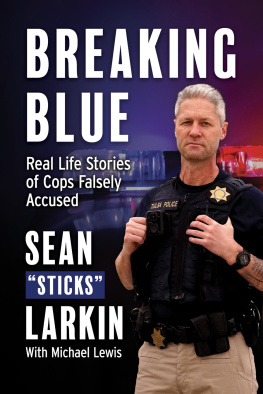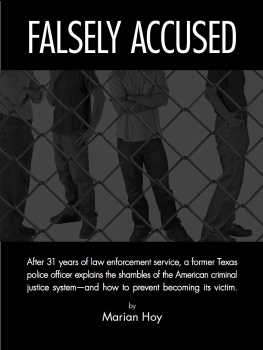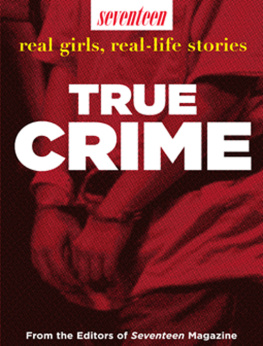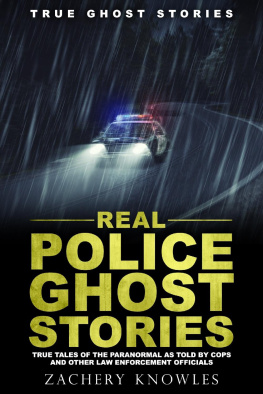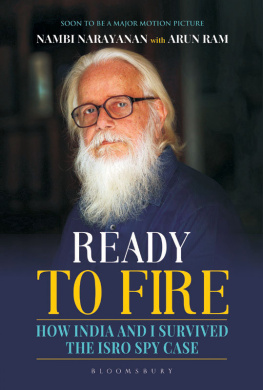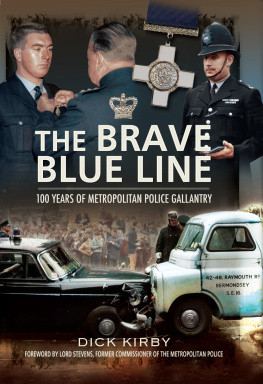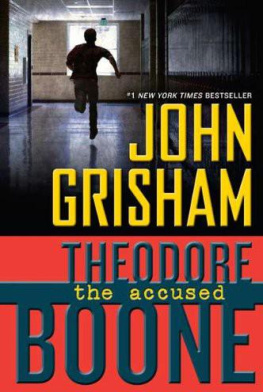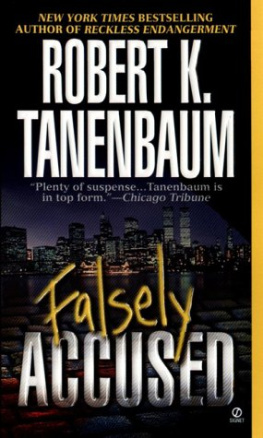All rights reserved.
No portion of this book may be reproduced in any fashion, print, facsimile, or electronic, or by any method yet to be developed, without the express written permission of the publisher.
dedication:
To anyone who has ever been falsely accused, the pages of this book are dedicated to you and to the truth.
Contents
Introduction
Lets get one thing straight off the bat. The truth is, not all cops are good. This should hardly come as a shock.
Why do I say that?
Law enforcement officers are human beings. In other words, were just like you. We have families: spouses and children, fathers and mothers, brothers and sisters. We have friends we care very deeply about, communities we love, and dreams were pursuing. We go through good times and bad times. We celebrate wins but we also make mistakes.
Being a police officer is like being an apple. The population of police officers is like a barrel of apples. And in any population, youre bound to get a few bad apples mixed with the good.
When it comes to cops, I can tell you without hesitation, the good apples want the bad apples tossed from the barrel. If theres one thing good cops cant really stand, its a bad cop. Trust me on this.
Unfortunately, recent events have conspired to make some people suspicious, or even afraid of cops. Not bad cops; I mean all cops.
Right now, the good cops are paying the price for isolated instances of atrocious conduct. Were all getting tarred with the same brush. And thats not right.
Its not just unfair. Its ignorant.
Thats part of why I wrote this book.
But you might be asking, Who is this guy?
My name is Sean Larkin. A lot of people call me Sticks.
I know, its a curious nickname. Heres how I got it:
Ever since I was a kid, its been my dream to become a cop. Back in the mid-90s, I was a twenty-one-year-old college student studying criminal justice. Im from the Bay Area but went to college in Tulsa, Oklahoma. So I figured the best way to gain some real, practical experience was to intern with the Tulsa Police Department.
Thats how I started doing ride-alongs.
Theyre just like you see in the movies and TV shows. Basically, you embed yourself with cops while theyre working their everyday shifts. A ride-along gives you a chance to see what the work of being a police officer is really like. So every Friday and Saturday night, Id ride with two officers from Tulsa PD, Thomas Luke Sherman and his partner, Mike Eckert, aka Eck.
One night, we got in a car chase with some gangsters. Eck drove like a bat out of hell. The siren was wailing. Our lights were flashing. The suspects car screeched to a stop, a door snapped open, and somebody bolted out.
I dont know what got into me. We were all hyped-up, our adrenaline flowing. Picture me. I was this skinny college kid wearing a ballistic vest, no gun or handcuffs, no baton. I just had a flashlight. Still, I jumped from our car and gave chase.
I dove for the suspects legs, brought him down, then got on top of him. Told him not to move. I was proud of myself for that.
When Eck caught up, he turned to me, glaring. He called me a fuck stick. He was right to be angry.
I wasnt a cop. I was only a kid doing a ride-along.
From that night on, I was Fuck Stick.
Later, when I went through the Tulsa police academy, Eck was one of my instructors. He knew that a persons reputation is everything when you work in law enforcement. So he shortened Fuck Stick to Stick. Which, once I got out on the streets, became Sticks.
The new name stuck like glue.
To be clear, nobody in my private life calls me Sticks. Im just Sean or Dad to my family and kids. But for anything work-related, it seems like everyone knows me as Sticks. Hell, even the mayor of Tulsa calls me Sticks. Its a little unnerving.
In 2016, I was offered a job with the team of Live PD and Live PD Presents: PD Cam on the A&E network.
The producers asked me, What do you want to be called? Should we call you Sean? Detective Larkin? Sticks? What?
Sticks, I said. Just call me Sticks.
It couldnt be anything but.
I joined the Police Department in my home city of Tulsa, Oklahoma, twenty-four years ago. Most of my career has been spent working in specialty units tasked with investigating or solving a specific crime issue. For instance, a specialty unit might handle narcotics investigations. Or violent crime. Or domestic abuse. Its members might serve warrants, rescue hostages, or work to disrupt criminal street gangs.
Dont let the details confuse you. In the end, specialty units all have the same purpose: the purpose of the police. Were there to protect and to serve. Were there to make our communities better, safer places where everyone can work and live.
I was asked to join Live PD and Live PD Presents: PD Cam because both programs showed cops across the country doing their jobs ... Live PD in real time and Live PD Presents: PD Cam directly from an officers point of view via their body or dashcam.
I had the books printers italicize realtime because its important.
When you show the real work of police officersthe truth, the whole truth, and nothing but the truthits a fact that youre going to see some action. By this, I mean car chases, takedowns, hot words spoken, even occasional guns being fired. Thats all part of being a cop in America.
But youre also going to see the nuances of the job. How being a police officer is like walking a tightrope, minute by minute and year after year. Our men and women in blue are in a constant state of tension. Consider the questions they deal with each day:
- Will the next suspect I deal with turn violent?
- Will they spit at me? Insult me? Stab me? Shoot me? Kill me?
- Will they do those things to my partner? Or even worse, to an innocent person?
- Will I get to go home to my spouse and my kids when my shift is finished today? Or will they get that call, the one that every relative of every police officer has nightmares about?
These are all dire questions. But theres another thats just as important. Its the question that made me write this book:
Will I be treated fairly?
Meaning if roles get reversed and I, a police officer, have to defend my methods, my professionalism, my integrity, and my reputation ... will I be presumed innocent until proven guilty?
Or will people leap to assumptions?
Like I said, I know this is tough to talk about now. 2020 was a tough year to be a cop. The media broke story after story alleging police brutality or behavior unbecoming of the badge.
I wont list the incidents here, were all aware of them. In many cases, I found it astonishing that police officers were being accused of murder and criminal activity before the facts of what took place were even released to the public. Celebrities, athletes, politicians, and social justice advocates were demanding that officers be charged, calling for changes to how policing in America should be conducted ... before they knew what had happened!
Am I saying the police were in the right in every one of these instances? Absolutely not. But its amazing to me that, these days, the police are often considered guilty of wrongdoing before all the facts of an incident have been gathered and reviewed. Innocent until proven guilty is a bedrock principle of American law and American life. It stems directly from guarantees made regarding due process in the Fifth and Fourteenth Amendments of the United States Constitution.

